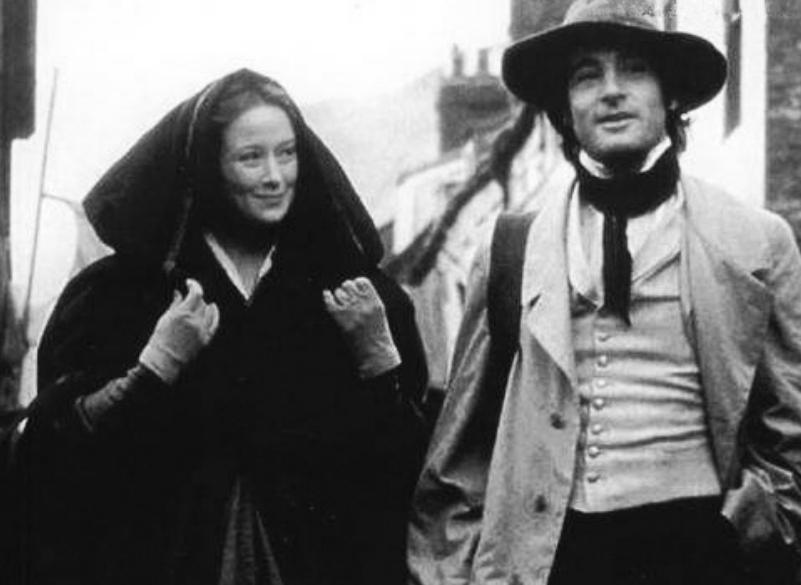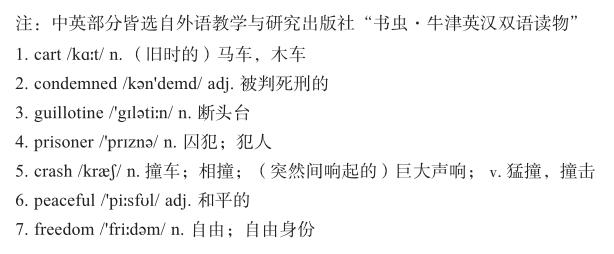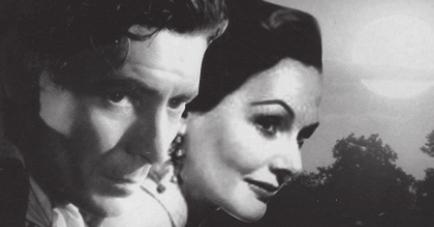两座城 两个世界
2019-07-02
原作节选
As the death-carts1 carry the condemned2 prisoners3 through the streets of Paris, crowds watch to see the faces of those who are to die. In the chairs around the Guillotine4, the friends of Madame Defarge are waiting for her. “Teresa, Teresa Defarge! Who has seen her? Shes never missed before!”
But the death-carts have arrived, and the Guillotine has already begun its work. Crash5! — A head is held up, and the women who sit knitting count One.
The supposed Evrémode helps the young girl down from the cart. He carefully places her with her back to the Guillotine, and she looks up gratefully into his face.
“Because of you, dear stranger, I am calm. I think you were sent to me by God,”she whispers.
“Or perhaps He sent you to me,” says Sydney Carton. “Keep your eyes on me, dear child, and do not think of anything else.”
“I do not mind while I hold your hand. I shall not mind when I let it go, if they are quick.”
“They are quick. Fear not!”
She kisses his lips;he kisses hers. Now the Guillotine is waiting. The young girl goes next, before him. The women count Twenty-Two, and Carton walks forward.
Twenty-Three.
They said of him that it was the most peaceful6 face ever seen there. What passed through Sydney Cartons mind as he walked those last steps to his death? Perhaps he saw into the future…
“I see Barsad, Defarge, the judges, all dying under this terrible machine. I see a beautiful city being built in this terrible place. I see that new people will live here, in real freedom7. I see the lives for whom I give my life, happy and peaceful in that England which I shall never see again. I see Lucie when she is old, crying for me on this day every year, and I know that she and her husband remember me until their deaths. I see their son, who has my name, now a man. I see him become a famous lawyer and make my name famous by his work. I hear him tell his son my story.”
“It is a far, far better thing that I do, than I have ever done;it is a far, far better rest that I go to, than I have ever known.”
當死囚车载着死刑犯们穿过巴黎的街道时,人们集中注意力看那些临死的人们的脸。德法奇夫人的朋友们正坐在断头台周围的椅子上等着她。“特丽莎,特丽莎·德法奇!谁见到她了? 她以前从来不曾错过这个!”
可死囚车已经到了,断头台已经开始工作。咔嚓!——一个人头被举起来,坐在那儿编毛线活的女人们数着“一个”。
那个被当做埃弗蒙的人帮着那个小女孩下了囚车。他小心地让她背对着断头台,她感激地抬头望着他的脸。
“因为您,亲爱的陌生人,我才这样平静。我想你是上帝送给我的礼物。”她小声说道。
“或许是上帝把你送给我的。”西德尼·卡登说,“眼睛看着我,亲爱的孩子,别的什么事都不要想。”
“我拉着你的手就不害怕,松开手后我也不害怕,如果他们能快点的话。”
“他们很快。别怕。”
她吻了他的嘴唇;他也吻了她的。断头台现在正在等着,下一个就是年轻的女孩子,在他之前。女人们数着二十二,接着卡登走上前去。
二十三。
人们谈论他,说他的脸是在那种地方见过的最平静的脸。当西德尼·卡登迈着最后的步伐向死亡走去时,他的脑海中想到了什么? 也许他看到了未来……
“我看见巴萨德、德法奇、法官们都在这个可怕的机器下面死去。我看到一个美丽的城市正在这片可怕的土地上建立起来。我看到新一代的人民将在真正的自由中生活。我看到我为之付出生命的人们,他们幸福安宁地生活在我再也见不到的英国。我看见露茜年老的时候,每一年的这一天都会为我哭泣,我知道她和她的丈夫会一直到死都记着我。我看见他们的儿子,有着和我一样的名字,现在长成了一个男人。我看见他成了一位著名的律师并通过他的工作使我扬名四方。我听见他给他儿子讲起我的故事。”
“我现在已做的,远比我所做过的一切都美好;我将获得的休息,远比我所知道的一切都甜蜜。”

“那是最美好的时代,那是最糟糕的时代;那是个睿智的年月,那是个蒙昧的年月;那是信心百倍的时期,那是疑虑重重的时期……我们大家都在直升天堂,我们大家都在直下地狱。”(It was the best of times, it was the worst of times;it was the age of wisdom, it was the age of foolishness;it was the epoch of belief, it was the epoch of incredulity...)
這是《双城记》(A Tale of Two Cities)的开头,也是英语文学史上——或许可以说是世界文学史上——最为人熟知的句子。作者狄更斯是除莎士比亚之外最受英国民众欢迎的作家。许多介绍狄更斯的文章都喜欢陈述他是如何精妙展示底层人民的苦难生活,以及如何在对黑暗社会不留情的揭露之中仍然留给人希望。
我第一次读狄更斯的作品是在初中时,读的是《圣诞颂歌》。进入大学中文系后,我喜欢上福楼拜、福克纳、陀思妥耶夫斯基之类更关注心理或者写作形式更为复杂的作家,对狄更斯大开大合的写法和简单的善恶两分变得不那么感兴趣了。来到英国念书后,我的专业转向社会学,伦敦是狄更斯最喜欢描写的城市,他在伦敦的旧寓所改造成的博物馆离我的学院也不过步行10来分钟的距离。在多重机缘之下,我重新开始读狄更斯的作品,《双城记》就是其中我最偏爱的一本。
《双城记》中的双城指巴黎和伦敦。它将背景设在18世纪末的法国大革命时期。那是一个经济、政治、社会文化发生全方位动荡的时代。在经济危机和战争失败的境况下,宗教与贵族势力为了维持自己的奢侈享乐,变本加厉地压迫、剥削平民。受启蒙思潮和欧洲大面积爆发的革命以及改革风潮的影响,法国社会长期积压的不满情绪终于爆发。当时的英国同样暗潮涌动,而贵族和王室依旧沉浸在歌舞升平之中,对平民的苦难置之不理。狄更斯写这本书所处的维多利亚时代是英国最动荡、也是发展最迅猛的阶段。早期维多利亚女皇统治下的英国有着严重的贫困、儿童劳工等社会问题(狄更斯在其他作品如《雾都孤儿》中,也关注到这些),但在这位明君的治理下,加上海外扩张带来的快速资本积累,英国社会总体而言呈现出一种在黑暗中摸索前行的希望。狄更斯写作这样一部长篇小说的真正目的,其实是借古讽今,借由对历史经验教训的总结,规劝统治阶级体察民情,积极进行社会改良。
《双城记》可以说从侧面展现了维多利亚时代对资本主义社会的思考,狄更斯看到了权贵阶层的腐朽,也没有忽视人性的复杂,德法奇太太一类革命者身上冷酷无情的一面在他的笔下展现得淋漓尽致。无政府、无秩序的暴力革命有时会将人性拉入深渊,谁站在正义的一边,这又该由谁来定义呢?文学阅读和批评贵在争鸣,感兴趣的同学不妨试试读完这本改写版的《双城记》。
(谢旭梦/赏析)
